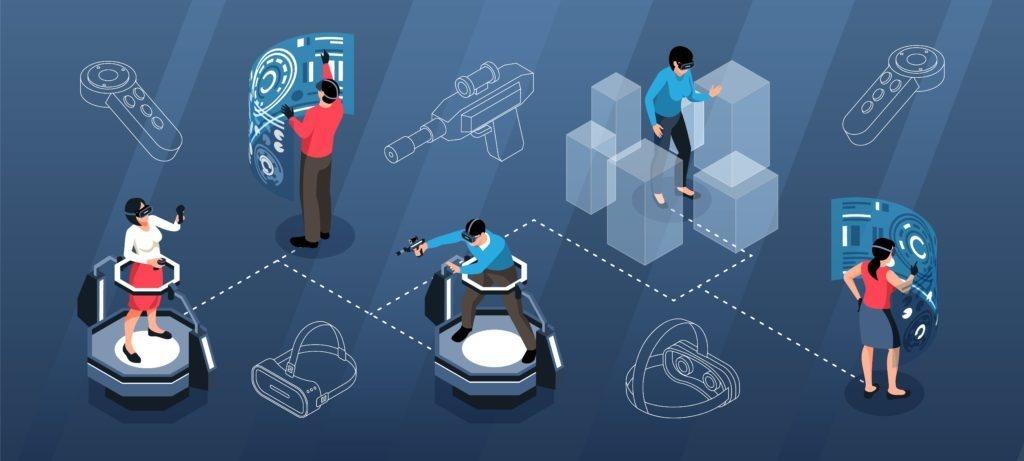We have witnessed a race by major technology companies to launch new platforms that signal the beginning of a new phase in the Digital Era: The Metaverse and Omniverse Era.
Those who perhaps believed AI, Blockchain, or Quantum would be the dominant force of the next Industrial Revolution are now likely wondering if The Metaverse or The Omniverse will play that key role.
From a futurist’s perspective, this is an exciting and long-awaited leap into immersive, multi-sensory, and converging technology experiences, however, we must also ask ourselves how will both of these poorly understood immersive digital ecosystems impact our society and culture?
From a digital ethicist’s perspective, one can expect significant concerns about how these will impact moral values and the ability to uphold ethical principles.
Experts were already warning about the profound and transformative socio-cultural impact of quantum, AI, blockchain, 6G, brain-computer interfaces, and other emerging technologies, as well as the need to prevent ethical violations. Now their concerns will be heightened and key stakeholders are faced with an even more complex Meta- and Omniverse-fueled digital ethics conundrum.
Challenges and Controversies
Before discussing the ethical dilemmas related to large-scale deployments of The Meta- and Mmniverse, we must first understand how they are defined. As highlighted in a recent technical paper published by Huansheng Ning and colleagues from Cornell University, The Metaverse is a “new type of internet application and social form that integrates a variety of new technologies”. The authors highlight its characteristics which are a symbiotic convergence of established technologies, emerging technologies, social media platform functionality and “hyper-spatio-temporality”. There is a vacuum of scientific papers on technical or ethical aspects related to The Omniverse, however, according to industry leaders promoting various applications such as Nvidia it is a trademarked term and represents “ a scalable, multi-GPU real-time reference development platform for 3D simulation and design collaboration, and based on Pixar’s Universal Scene Description and NVIDIA RTX™ technology.”
Some of the key ethical concerns that ethicists are already envisioning for both The Metaverse and Metaverse are related to consumer trust and rights, “misuse or unauthorized use of metaverse or omniverse-generated data, as well as extreme vulnerability to cyber-attacks. Would The Metaverse and Omniverse deployments pass a basic ethics checklist? More than likely not.
It would be difficult to argue that they meet the beneficence criteria and while some might argue that the intent is clearly to promote innovation and societal progress, they certainly increase the potential for malicious use. Given the multiple breaches published and the stats on cybersecurity that continue to show exponential increases in cyber-attacks for major companies, one would be concerned that they both would fail the strictest criteria for confidentiality and integrity.
While we do not have any proof yet regarding their ability or inability to uphold the principles of fidelity, integrity, and autonomy, we can certainly extrapolate from past deployments of other emerging technologies that were significantly less sophisticated. That methodology would sadly lead us to expect them both to fail.
If the technology companies that seem to be racing to achieve Meta- or Omniverse-supremacy would consider state-of-the-art ethics to be a competitive advantage we might have a pleasant surprise for once in our history and actually learn valuable insights from our past mistakes. Few companies have understood the need to be proactive and invest upfront in complex digital ethics and data governance programs.
To mitigate the potential negative consequences induced by The Meta- and Omniverse, we must advocate for the design and deployment of proactive digital ethics, proactive cyber-defense programs and creating a culture of digital ethics and cyber-awareness. Furthermore, these would need to be integrated and hrmanonized with other enterprise compliance programs to prevent ethical breaches.
While regulatory and legal experts are still trying to bridge the gap in frameworks that can address emerging technologies such as blockchain, AI, or next-generation computing, they must now face an even larger challenge as the Metaverse and Onniverse are trespassing multiple industry boundaries, while posing unique, novel ethical challenges.
Opportunities
So who are the key stakeholders that can engage in a global Meta- and Omniverse Data Governance and Ethics Program? Governments, academia, the private sector, and not-for-profit organizations would all have to collaborate to be successful. In addition to legal and regulatory updates, developing international standards, implementing key ethical performance indicators, as well as embracing societal expectations of diversity and inclusion will be paramount. First, we would have to establish the ethical design philosophy and desired outcomes for a society fully immersed in the Meta and Omniverse. Second, we would aim to create a robust ethics architecture that would ensure adequate data governance and address identity management, privacy, security, ownership challenges etc. Third would be the development of a customized ethical framework for various industries or domains. This framework would include the impact on society, the environment, long-term sustainability, education, and emphasis on ESGs.
Future Directions
Pessimists will likely envision the worst possible outcomes with a negative impact on education, arts, culture, social interaction, etc.
Optimists will hope that companies leading the charge in deploying the Meta- and Omniverse would be ethically and purpose-driven, with a vision and mission that aim to deliver “ethical, transparent” services or even to facilitate the attainment of UN SDGs.
News
Repurposed drugs could calm the immune system’s response to nanomedicine
An international study led by researchers at the University of Colorado Anschutz Medical Campus has identified a promising strategy to enhance the safety of nanomedicines, advanced therapies often used in cancer and vaccine treatments, [...]
Nano-Enhanced Hydrogel Strategies for Cartilage Repair
A recent article in Engineering describes the development of a protein-based nanocomposite hydrogel designed to deliver two therapeutic agents—dexamethasone (Dex) and kartogenin (KGN)—to support cartilage repair. The hydrogel is engineered to modulate immune responses and promote [...]
New Cancer Drug Blocks Tumors Without Debilitating Side Effects
A new drug targets RAS-PI3Kα pathways without harmful side effects. It was developed using high-performance computing and AI. A new cancer drug candidate, developed through a collaboration between Lawrence Livermore National Laboratory (LLNL), BridgeBio Oncology [...]
Scientists Are Pretty Close to Replicating the First Thing That Ever Lived
For 400 million years, a leading hypothesis claims, Earth was an “RNA World,” meaning that life must’ve first replicated from RNA before the arrival of proteins and DNA. Unfortunately, scientists have failed to find [...]
Why ‘Peniaphobia’ Is Exploding Among Young People (And Why We Should Be Concerned)
An insidious illness is taking hold among a growing proportion of young people. Little known to the general public, peniaphobia—the fear of becoming poor—is gaining ground among teens and young adults. Discover the causes [...]
Team finds flawed data in recent study relevant to coronavirus antiviral development
The COVID pandemic illustrated how urgently we need antiviral medications capable of treating coronavirus infections. To aid this effort, researchers quickly homed in on part of SARS-CoV-2's molecular structure known as the NiRAN domain—an [...]
Drug-Coated Neural Implants Reduce Immune Rejection
Summary: A new study shows that coating neural prosthetic implants with the anti-inflammatory drug dexamethasone helps reduce the body’s immune response and scar tissue formation. This strategy enhances the long-term performance and stability of electrodes [...]
Scientists discover cancer-fighting bacteria that ‘soak up’ forever chemicals in the body
A family of healthy bacteria may help 'soak up' toxic forever chemicals in the body, warding off their cancerous effects. Forever chemicals, also known as PFAS (per- and polyfluoroalkyl substances), are toxic chemicals that [...]
Johns Hopkins Researchers Uncover a New Way To Kill Cancer Cells
A new study reveals that blocking ribosomal RNA production rewires cancer cell behavior and could help treat genetically unstable tumors. Researchers at the Johns Hopkins Kimmel Cancer Center and the Department of Radiation Oncology and Molecular [...]
AI matches doctors in mapping lung tumors for radiation therapy
In radiation therapy, precision can save lives. Oncologists must carefully map the size and location of a tumor before delivering high-dose radiation to destroy cancer cells while sparing healthy tissue. But this process, called [...]
Scientists Finally “See” Key Protein That Controls Inflammation
Researchers used advanced microscopy to uncover important protein structures. For the first time, two important protein structures in the human body are being visualized, thanks in part to cutting-edge technology at the University of [...]
AI tool detects 9 types of dementia from a single brain scan
Mayo Clinic researchers have developed a new artificial intelligence (AI) tool that helps clinicians identify brain activity patterns linked to nine types of dementia, including Alzheimer's disease, using a single, widely available scan—a transformative [...]
Is plastic packaging putting more than just food on your plate?
New research reveals that common food packaging and utensils can shed microscopic plastics into our food, prompting urgent calls for stricter testing and updated regulations to protect public health. Beyond microplastics: The analysis intentionally [...]
Aging Spreads Through the Bloodstream
Summary: New research reveals that aging isn’t just a local cellular process—it can spread throughout the body via the bloodstream. A redox-sensitive protein called ReHMGB1, secreted by senescent cells, was found to trigger aging features [...]
AI and nanomedicine find rare biomarkers for prostrate cancer and atherosclerosis
Imagine a stadium packed with 75,000 fans, all wearing green and white jerseys—except one person in a solid green shirt. Finding that person would be tough. That's how hard it is for scientists to [...]
Are Pesticides Breeding the Next Pandemic? Experts Warn of Fungal Superbugs
Fungicides used in agriculture have been linked to an increase in resistance to antifungal drugs in both humans and animals. Fungal infections are on the rise, and two UC Davis infectious disease experts, Dr. George Thompson [...]
























